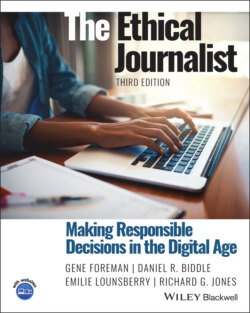Читать книгу The Ethical Journalist - Gene Foreman - Страница 72
Applying Perspective
ОглавлениеIt is well to conclude this chapter by trying to put the public criticism in perspective. Despite the complaints, people do say good things about the news media in the surveys. They are more likely to praise the news source they depend on – the newspaper that brings them local news, or the cable channel that connects them to the larger world. Their negative assessment of “the media” may be based on what they’ve heard, not their personal experience.
For that matter, “the media” is a nebulous, inaccurate term that contributes to public misunderstanding about journalism. The New York Times and the New York Post have little in common. Partisan blogs differ from the websites of the mainstream newspapers and broadcast networks. Fox News and MSNBC are polar opposites.
Although it is true that credibility has fallen sharply since the 1980s, you should bear in mind that complaints about journalists are nothing new.
Consider these complaints: “News is distorted. Some newspapers invade privacy. Scandal and ‘sex’ stories are printed solely to sell papers. Innocent persons are made to suffer needlessly by publicity. The real interest of the press is money‐grubbing.”
Those appeared in Leon Nelson Flynt’s book, The Conscience of the Newspaper.
It came out in 1925.26
